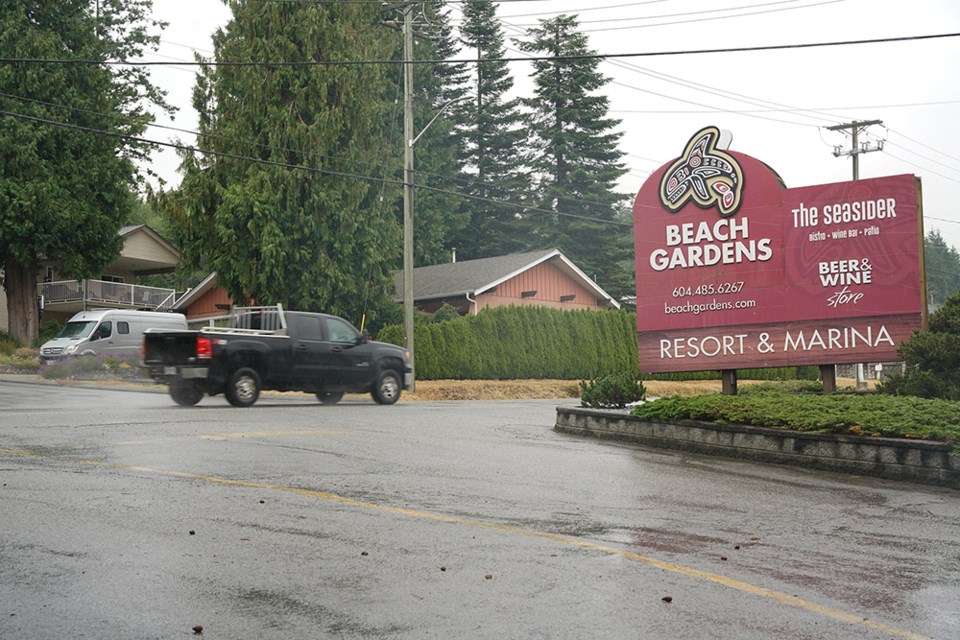City of Powell River councillors were provided an update on a traffic impact study conducted in and around the Beach Gardens Resort and Marina.
At the July 3 city council meeting, Jan Voss, president of CTS Traffic Engineering Specialists, said he was appearing on behalf of his client, Jack Barr. He said he had been conducting studies in Powell River over eight years for different developments, including for Seaboard Hotels, owner of the Beach Gardens.
“My job is as a technical advisor,” said Voss. “I’m here to present the facts and tell you what my technical observations are and let the community and you as council make a decision about what is appropriate for your community.”
Voss said the study was started in May of 2024 and the first thing he does is work with the road authorities, in this case, the ministry of transportation and transit, as well as the city, before any field work is done.
“That process resulted in an approved study terms of reference, and then the draft report, when we issued it, was reviewed by both the city and the ministry before we issued a final report,” said Voss.
He said data was collected the week after the May long weekend and looked at ministry of transportation data to see what the seasonal variations are. Data was collected on a Friday because that is the busiest day on Highway 101 at the Beach Gardens location. Traffic cameras were used for the data collection process for 12 hours, and from that, six hours of data was extracted, said Voss.
“I can tell you how much traffic entered the Beach Gardens Resort, how many trucks we captured, and data like that,” he added. “One of the things I noticed when I did my site visit here in May of last year was quite a few deficiencies at the four intersections we were asked to look at. Each intersection had problems, and those problems were noted in the report. I recommended that those deficiencies be addressed.”
Voss said he was on site on July 3 and noted that not a single one had been addressed by either the ministry or the city.
“There were improvements recommended but they have not been done yet,” said Voss.
One of the features he noted was the existing site access to the Beach Gardens from the highway is too close to Cariboo Avenue.
“It does not meet current design standards for proximity of major driveways,” said Voss. “The applicant was proposing this to be on Cariboo, which the ministry supported.”
Mayor Ron Woznow said when he looked at the property, and the fact that the owners want to develop at that site, why wouldn’t they put in a new road on the northern side of the property?
“That way, they have no impact on the existing community,” said Woznow. “They could design it in a way that would be good today, five years from now and 20 years from now. They could remove a lot of the issues we are hearing about. Did you look at that as an alternative?”
Voss said that was not a prospect he had examined because the access was going to be closed, so he looked at how the intersections would work coming in from the side streets, both Lillooet Place and Cariboo. He said there was no consideration of a new access road.
Prior to Voss’s presentation, during the public input period, three people made presentations regarding the traffic study. Kathryn Hjorleifson said the study did not include all existing traffic in the area, excluding traffic from some surrounding streets.
She also said one of the tables in the report made assumptions that she did not believe were accurate in terms of potential traffic in and out of the site.
“Statistics in the table are off by more than 300 per cent,” said Hjorleifson. “This table is only analyzing peak hours.
“This study has not looked at traffic patterns. Raw data rarely gives a complete story. Do traffic patterns change when you add very dense residential development to a small area? Yes, they do.”
She said the study does not include an analysis of speed, and that much of the traffic is going well over 50 kilometres per hour.
“I sincerely hope you will consider these issues, omissions and errors, as you listen to the report from CTS,” said Hjorleifson. “In my opinion, it is inadequate.”
Bruce Kipling, a Westminster Street resident, said statistical measurements of the CTS traffic study were limited to two days, which he termed a limited sample size and said was inadequate.
“The study fails to provide alternative routes,” said Kipling. “It fails to incorporate road width, pitch and radius, with large vehicles turning down residential streets.”
Bob Allen, also a Westminster Street resident, said he had met on the site with Jack Barr, acting on behalf of Seaboard Hotels.
“After going home, I had the distinct impression he was looking to get maximum occupancy and forget about the rest of the neighbourhood, forget about the traffic problems and just get the rezoning through,” said Allen. “There are no plans of where traffic should flow in and out of the development and no plans of where traffic should flow from Beach Gardens up to the highway.
“I met with him to show an alternative, but at the end of the day, he wasn’t able to go to that alternative. I walked away with a bad feeling about his commitment to doing something for the neighbourhood.”
Last year, Meta censored Canadian news from its feeds, so we built our own social platform: syrupsocial.com – a newsfeed powered by Canadian journalists. Join the Peak on Syrup for the latest news from the Sunshine Coast and beyond, and add the Peak's email list for the top headlines right in your inbox Monday to Friday.


